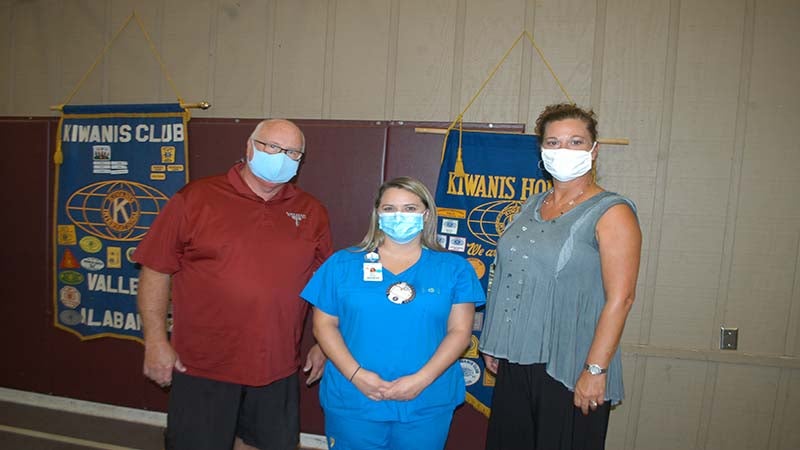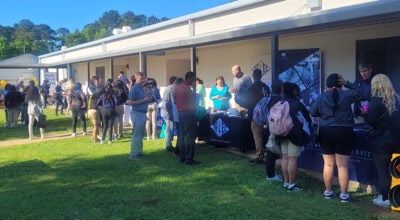Superintendent updates first week of school, COVID-19 cases
Published 6:50 am Thursday, August 20, 2020
|
Getting your Trinity Audio player ready...
|
VALLEY — The Chambers County School District completed the first week of a new school year on Wednesday. Superintendent Dr. Kelli Hodge was the guest speaker at Wednesday’s noon hour meeting of the Kiwanis Club of Valley and talked about how the new school year is going.
As of noon on Wednesday, Hodge said a total of six students had not started the school year because they were in quarantine, four had tested positive and 20 more were sent home because of exposure to those who’d tested positive. They will be in quarantine for 10 to 14 days until a doctor releases them to return to school. Of those 20 students, five of them are showing possible symptoms of COVID-19. Those who have been sent home must be symptom-free for at least three days before being allowed to return.
Of the school system staff, three employees tested positive before classes resumed. They are in quarantine and will return when cleared by a doctor. One additional employee has tested positive since the start of school and is now in quarantine along with two others who were exposed. Thus far, no one has reported to school after having had a positive test.
“Our numbers are small, but we are trying all we can to mitigate the best we can,”
Hodge said. “We have never experienced anything like this before, and there will be things we were not expecting. We are following the CDC (Centers for Disease Control and Infection) guidelines. We are also following the Alabama Department of Public Health’s advice. Their website is a wonderful resource. It can help you a lot.”
Before the new school year began, families were given a choice of whether they wanted their children to attend classes in the traditional way or to have online education.
“The majority of them preferred classroom education,” Hodge said. “Seventy-five percent of our students are in traditional education with 25% in virtual education. Our staff was very apprehensive about the way things would go, but it’s gone very well so far. The students are wearing their masks and staying six feet apart.”
The teachers have found a novel way to get them to do that. When the students are in the hallways they are pretending to be zombies. They are wearing masks and maintaining their distance from their fellow zombies who are walking the halls.
“Our teachers are creative in keeping them apart, and the students are having fun in keeping six feet away,” Hodge said.
There are some issues that need to be overcome with the online portion. The students in sixth grade through twelfth grade are doing okay. For the most part, they are familiar with online education.
“The problem we are having is with the students in K-5,” Hodge said. “It’s new for both them and their parents. We are working on it, and it’s getting better.”
There’s also a problem of lots of people logging on at the same time. A major asset for the system is the fact that all the students have access to Chromebooks.
“Those in our virtual program can check them out and have them at home,” Hodge said. “If we have to close down — all the students can have this technology at home with them. For now, things are going well with this.”
Getting the school year off on the right foot was not an easy chore.
“We had everyone from the custodial staff and the bus drivers to the teachers and central office staff coming in to plan their work routines in ways to be safe,” Hodge said.
A major factor in the smooth start is that the system has had a virtual program for the past five years.
“We have had about 250 kids in it,” Hodge said.
In following the CDC guidelines there’s what’s known as the 615 rule. What that means is if you have been within six feet for a period of 15 minutes or more to someone who is tested positive, you have been exposed to the virus and must be isolated.
“Every Friday, we will have a report card on infections,” Hodge said. “It will list our positive cases, and those who have been sent home after being exposed.”
It’s listed on the system’s web site.
“We are talking about this a lot,” Hodge said. “No decisions are made without consulting with each other. We are busting our tails to get this right.”
Something new this year is that each school in the system has a full-time nurse. Hodge credits Gov. Kay Ivey on having seen to this on a statewide basis.
“We thank the state for doing this,” Hodge said. “This is something we have needed all along. We have kids with health complications and need access to rapid care.”
State Rep. Debbie Wood, who was a guest at the meeting, said contact tracing is what’s needed.
“We need a contact tracer at every school,” she said. “Without this, we are putting so much work on the school nurses and the teachers.”
Hodge said that schools have always been a lifeline for children in the traditional setting. She said efforts are being made for this to continue for those in the virtual program.
“They can receive drive-by lunches,” she said. “They can also receive school supplies like the students do in the traditional setting. If needed, they can have access to counselors. There’s a facilitator assigned to every student in our virtual program.They will stay in touch with them to see they are getting everything they need.”
Hodge said that the monthly school board meetings are being carried via Facebook Live. “Everyone can see it,” she said. “We will be having our second budget hearing this evening. We will also have a graduation ceremony for the students who finished this summer. We want to celebrate what they have accomplished.”
Hodge said the educators must do all they can to keep children from falling into cracks in the system.
“Research shows that when a student starts falling behind, those gaps can widen,” she said. “These are gaps that can affect a community. You can have young people who are not ready for the workforce.”
Hodge said that her brother-in-law is originally from Taiwan, a small, densely populated country that has had spectacular success in fighting COVID-19.
“They frequently wear masks and are accustomed to it,” she said. “That made a big difference for them with COVID. Masks are the number one deterrent. Our kids are getting used to wearing them. We don’t have to tell them to do it anymore. It’s like wearing clothes. You weren’t born with them on, but you learned to wear them. It’s the same thing with a mask. It’s something you learn to do.”
Hodge said that every student and the employees had been provided masks by the state. There is a problem with other needed products.
“Everyone’s supply chain is backlogged,” she said. “There’s a need for cleaning supplies and paper towels. The protective gowns are almost impossible to get right now.”




